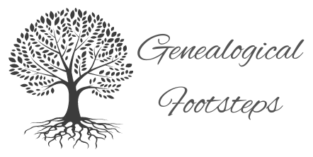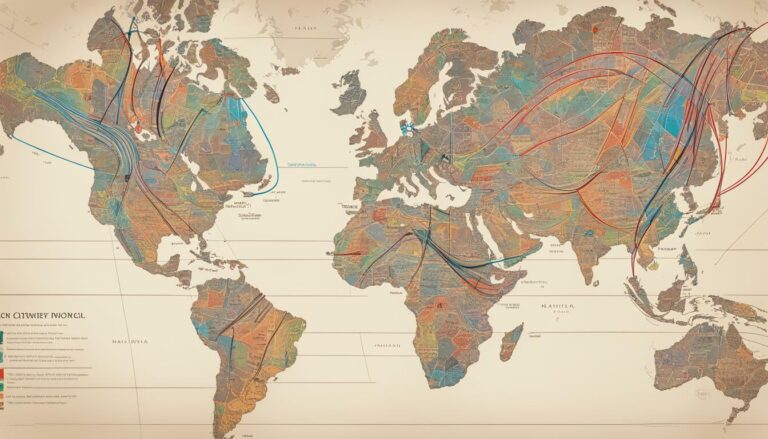Diaspora tracing is a growing field of research that allows individuals to uncover the historical journey of global communities. By tracing their roots and conducting a family heritage search, people can gain a deeper understanding of migration patterns, cultural ties, and forgotten histories. Diaspora genealogy and ancestry tracking are just some of the methods employed in this process.
Key Takeaways
- Diaspora tracing is a valuable tool in understanding the movements and connections of global communities.
- Tracing your roots and conducting a family heritage search can provide a sense of identity and belonging.
- Diaspora genealogy is essential in connecting individuals to their ancestral communities and reviving cultural practices.
Understanding Diaspora Tracing
Tracing one’s family history is a crucial element of diaspora research. Ancestry tracking is an essential tool for anyone seeking to uncover their cultural heritage and understand migration patterns within their community.
The process of tracing family history involves gathering information from a variety of sources, including public records, family stories, and genealogy websites. It is a time-consuming process that requires patience and persistence, but the results can be incredibly rewarding.
One of the first steps in tracing family history is to gather as much information as possible from family members. Oral histories and family stories can provide valuable clues about migration patterns, family relationships, and cultural practices. Census records, birth and death certificates, and immigration documents can also help to fill in the gaps in one’s family history.
Genealogy investigation is another method used in diaspora tracing. Genealogy websites such as Ancestry.com and FamilySearch.org can help individuals uncover their family trees and connect with distant relatives. DNA testing services are also becoming increasingly popular, allowing individuals to trace their ancestral roots and connect with relatives around the world.
The Importance of Tracing Family History
Tracing family history is not just about uncovering the past; it can also provide a sense of identity and belonging. By understanding their roots and cultural heritage, individuals can develop a deeper connection to their community and gain a better understanding of their place in the world.
Tracing family history also plays a crucial role in diaspora research. By uncovering migration patterns, individuals can gain insights into the historical journey of their community and understand the cultural ties that bind them together.
The Significance of Diaspora Genealogy
Tracing your roots through diaspora genealogy can be a deeply fulfilling experience, providing a sense of connection to your ancestral community. Through genealogy investigation, you can uncover forgotten ties, rediscover cultural practices, and learn about your family history.
Genealogy investigation plays a crucial role in connecting individuals to their ancestral communities. It involves researching and documenting family relationships and records, bringing to light the historical journey of your family. It can also reveal significant migration patterns within diasporas, helping to understand the movements of communities across the globe.
Furthermore, tracing your roots through diaspora genealogy can provide a sense of identity and belonging, fostering a renewed appreciation for your family’s history and cultural heritage. By preserving your family history, you can also contribute to the collective diaspora heritage, ensuring that future generations can learn about their ancestral communities.

Uncovering Migration Patterns
Tracing the migration patterns of diasporas can be a challenging but rewarding process. It involves using historical records, migration documents, and oral histories to track the movements of communities across different regions.
Diaspora Tracking with Historical Records
Historical records such as census data, passenger lists, and naturalisation records can provide valuable information on when and where individuals from a particular community migrated. Researchers can also use these records to identify important events or societal changes that may have influenced migration patterns.
Diaspora Tracking with Oral Histories
Oral histories can offer a unique perspective on diaspora movements, particularly in cases where historical records are incomplete or unavailable. Stories passed down through generations of families can shed light on the motivations behind migrations and the experiences of those who made the journey.
Diaspora tracking can also reveal unexpected connections between communities that may have been long forgotten. For example, tracing the movements of South Asian communities around the world reveals surprising ties between India, Africa, and the Caribbean.
Despite the challenges, diaspora tracking can provide a deeper understanding of the historical journey of a particular community, shedding light on the experiences and struggles of those who migrated and the impact they had on the places they settled.
Migration Document Examples:
Here’s a detailed table of the various migration records available to genealogists and family historians:
| Document Type | Description | Typical Information Provided | Potential Research Use |
|---|---|---|---|
| Passenger Lists | Records of passengers arriving by ship, commonly available from the 19th and 20th centuries. | Name, age, occupation, nationality, last residence, destination | Identifying immigrant ancestors, understanding migration trends. |
| Naturalisation Records | Documents related to the process of becoming a citizen of a country. These can range from the initial declaration of intent to the final naturalisation certificate. | Name, birthplace, date of birth, arrival date, residence | Tracing foreign birthplaces, dating immigration. |
| Border Crossing Records | Records of individuals crossing from one country to another, most notably along the U.S.-Canada and U.S.-Mexico borders. | Name, age, nationality, birthplace, destination | Tracing movements between countries, especially for North American ancestors. |
| Immigration Files (A-Files) | U.S.-specific files created by the Immigration and Naturalisation Service (INS) for individuals who immigrated to the U.S. in the mid-20th century. They contain a wealth of personal information. | Comprehensive personal data, including biographical information | Gaining detailed insights into an ancestor’s life after immigration. |
| Emigration Records | Records created when individuals left certain countries; these can be more difficult to find and may exist in various forms depending on the country of origin. | Name, destination, sometimes reason for emigration | Understanding the departure point and reasons for leaving. |
| Passport Applications | Applications for passports can provide details not only about the individual but also about their travels. | Photograph, physical description, birthplace, residence | Visual identification, confirming personal details. |
| Crew Lists | Records of crew members aboard ships, which can be useful for tracing ancestors who worked at sea. | Name, position, nationality, sometimes age or birthplace | Tracing maritime ancestors or those with occupations related to seafaring. |
| Alien Registration Records | Records of non-citizens residing in a country. In the U.S., these are particularly relevant for the early 20th century. | Name, birthplace, address, employment, photograph | Identifying foreign-born residents and understanding their lives in a new country. |
| Colonial Muster and Census Records | Early records that can include details about settlers and convicts in colonies, particularly in the British Empire. | Name, occupation, location, sometimes family details | Tracing early colonial ancestors, understanding settlement patterns. |
| Railway Employee Records | Records of individuals employed by railway companies, which can sometimes include details of transfers and relocations for work. | Name, position, transfers, sometimes family details | Tracing ancestors who moved for work, especially in the railway industry. |
| Land and Property Records | While not directly migration records, they can indicate movement through the purchase and sale of land, or the granting of land by governments to settlers and immigrants. | Name, property details, sometimes previous and new residence | Inferring migration through changes in land ownership or location. |
This table represents a starting point for genealogists researching migration patterns. The availability and detail of these records can vary widely by country and time period, so researchers should consider the specific historical and geographical context of their ancestors when seeking out these documents.
Tracing Forgotten Cultural Ties
Tracing family history and conducting diaspora research can provide a plethora of benefits, including the opportunity to rediscover forgotten cultural ties. For many individuals, connecting with their ancestral traditions is an essential part of their identity, and tracing their roots can reveal a rich and diverse cultural heritage.
By delving into family history, individuals can learn about their ancestors’ customs, beliefs, and practices, and gain insight into the traditions and values that have been passed down through generations. Tracing forgotten cultural ties can also help to revive cultural practices that may have been lost over time, and foster a sense of pride in one’s heritage.
Additionally, tracing family history can provide a deeper understanding of the migration patterns and movements of diasporas. By exploring the historical journey of their ancestors, individuals can gain a new perspective on the struggles and triumphs of their communities, and better appreciate the diversity and complexity of the diaspora heritage.
Tools and Resources for Diaspora Tracing
Tracing your roots and conducting genealogy investigation can be a daunting task without the right tools and resources. Fortunately, there are many resources available online and offline to help you trace your family history and discover your cultural heritage. Here are some of the most valuable tools and resources for diaspora tracing:
Online Databases
Online databases are a treasure trove of information for those tracing their roots. Many genealogy websites offer access to historical records, such as census data, marriage and death certificates, and immigration records. Some of the most popular genealogy websites include Ancestry, FamilySearch, and MyHeritage.
DNA Testing Services
DNA testing services can also be a valuable tool in diaspora tracing. DNA tests can help you uncover your ancestry and connect with relatives you never knew existed. Companies like 23andMe, AncestryDNA, and MyHeritage DNA offer DNA testing services that can shed light on your family history.
Archives
Archives are another great resource for diaspora tracing. Many archives, libraries, and historical societies keep records of immigration and naturalisation that can help you trace your family’s journey. Some archives may also have oral histories, photographs, and other materials that can provide insights into the customs and traditions of your ancestors.
This table outlines various tools and resources available to genealogists focusing on diaspora tracing.
These resources vary in scope, covering both digital and physical archives, databases, and methodologies that cater to different diaspora communities worldwide.
| Resource Type | Name/Platform | Description | Geographical Focus | Access (Free/Paid) |
|---|---|---|---|---|
| Online Database | Ancestry.com | A comprehensive genealogy database offering records, DNA testing, and family tree services. | Global | Paid |
| Online Database | FamilySearch | A free genealogy database run by The Church of Jesus Christ of Latter-day Saints, offering access to millions of historical records. | Global | Free |
| Archive Collection | The National Archives | Offers a vast collection of documents and records pertinent to genealogy research, including census data, military records, and immigration records. | UK, US, and others | Free/Paid |
| Online Database | MyHeritage | Provides access to billions of historical records, DNA testing, and sophisticated tools for building family trees. | Global | Free/Paid |
| Specialised Database | Africana Heritage Project | Focuses on records related to African American genealogy, including slave records, Freedmen’s Bureau records, and black newspapers. | US | Free |
| Specialised Database | Caribbean Genealogy Library | A resource for tracing ancestors in the Caribbean, offering access to a variety of records, including baptism, marriage, and burial records. | Caribbean | Free/Paid |
| Digital Archive | Digital Library of India | Offers access to digital copies of Indian historical documents, including British colonial records, princely state documents, and photographs. | India | Free |
| Community Forum | JewishGen | A platform dedicated to Jewish genealogy, offering databases, research tools, and a community forum for sharing insights and discoveries. | Global, with a focus on Jewish diaspora | Free/Paid |
| Specialised Database | Chinese Family History Group | Provides resources and guides for tracing Chinese ancestry, including clan books, immigration records, and cemetery records. | China and Chinese diaspora | Free/Paid |
| Research Service | International Tracing Service | An organisation that assists individuals in tracing the fates of family members affected by Nazi persecution, forced labour, and the Holocaust. | Europe | Free |
These resources are just a starting point. Effective diaspora tracing often requires a mix of these tools, depending on the specific community and geographical area of interest. Additionally, local libraries, historical societies, and genealogical societies often have unique resources and experts who can provide valuable assistance.
Challenges in Diaspora Tracing
Despite the benefits of tracing family history and diaspora research, there are several challenges that individuals may encounter. These include incomplete records, language barriers, and the impact of historical events on the availability of information.
One major obstacle in diaspora tracing is the lack of complete and accurate records. Many historical documents may have been lost or destroyed over time, making it difficult to piece together a comprehensive family history. In addition, language barriers can make it challenging to decipher old documents or communicate with potential relatives in different countries.
The impact of historical events such as wars, conflicts, and natural disasters can also complicate the process of diaspora research. These events may have displaced entire communities or resulted in the loss of important records, making it difficult to track migration patterns and heritage.
Despite these challenges, there are strategies that individuals can use to overcome them and continue their genealogy investigation. For example, seeking out multiple sources of information, utilising translation services, and connecting with local organisations or experts in diaspora tracing can all be helpful in overcoming these obstacles.
The Impact of Diaspora Tracing
Diaspora tracing has a significant impact on individuals and communities by fulfilling the innate human desire to connect with one’s roots. Through tracing family histories, individuals can gain a deeper understanding of their cultural identity and heritage, which can promote a sense of belonging and pride in one’s ancestral traditions. This process can also foster connections between family members, both living and deceased, and across geographical distances.
Furthermore, diaspora tracing has a wider impact on the collective diaspora heritage. By uncovering migration patterns and forgotten cultural ties, individuals can contribute to the preservation and promotion of diaspora culture. This can be particularly important for communities that have experienced a history of displacement or assimilation, as it allows for the rediscovery and revitalisation of cultural practices that may have otherwise been lost.
The impact of diaspora tracing is not limited to individuals and communities. It can also have important implications for academic research, providing valuable insights into the movements and connections between diaspora communities. This can contribute to a better understanding of global history and the impact of migration on cultural exchange.

Future Trends in Diaspora Tracing
The field of diaspora tracing is constantly evolving, with new technologies and techniques being developed to help individuals trace their roots and connect with their ancestral communities. Here are some of the future trends to watch out for:
Digitisation of Records
As more historical records are being digitised, it is becoming easier to access and search for information online. This will make it easier for individuals to track their family history and migration patterns, even if their families originated from remote or hard-to-reach places.
Increased Collaboration
Research in diaspora tracing is increasingly a collaborative effort between genealogists, historians, and local communities. Collaboration can help to fill gaps in knowledge and understanding of local customs, beliefs, and histories, leading to more accurate and comprehensive understanding of diaspora movements.
Advancements in DNA testing
As the technology in genealogy testing advances, more and more people are using DNA testing to trace their ancestral roots. This DNA testing, coupled with extensive genealogical research, has the potential to provide a more comprehensive picture of the diaspora journey.
Inclusion of Oral Histories
Oral histories have traditionally been a valuable source of information for tracing family histories. However, as historical event’s effects fade with time, it is important to collect and preserve these oral histories as a means of exploring and documenting the history of the diaspora.
The future of diaspora tracing looks promising, with advances in technologies and increased collaboration contributing to more effective and comprehensive tracing methods for individuals to explore their ancestral roots.
Concluding Remarks: Unlocking the Power of Diaspora Tracing
Diaspora tracing plays a vital role in understanding the historical journey of communities and uncovering forgotten cultural ties. Through tracing family history and genealogy investigation, individuals can gain a deeper understanding of their roots and identity. Diaspora tracking can also provide insights into migration patterns and connections between communities across different regions.
In addition to preserving cultural heritage, diaspora tracing can foster a sense of belonging and promote cultural preservation. It can also contribute to the collective diaspora heritage, as individuals rediscover and revive cultural practices.
Despite the challenges faced in diaspora tracing, such as incomplete records and language barriers, there are a variety of tools and resources available. Online databases, genealogy websites, DNA testing services, and archives can assist individuals in their quest to trace their family history and heritage.
Looking to the future, emerging technologies and digitisation of records hold promise for increased collaboration between researchers and communities in uncovering and preserving diaspora histories.

My name is Anthony, the founder of Genealogical Footsteps. I have over 20 years of dedicated experience in family history and genealogy (although I am not a professional genealogist). I hold BA in history, and am considering further education (despite my age). My journey in genealogy has led me to remarkable discoveries and projects, particularly where my Cypriot genealogy is concerned. I am passionate about uncovering the stories behind names and have helped friends and family connect with their heritage, including those with Cypriot, Celtic, and Viking ancestry. Click here to read more about me.


